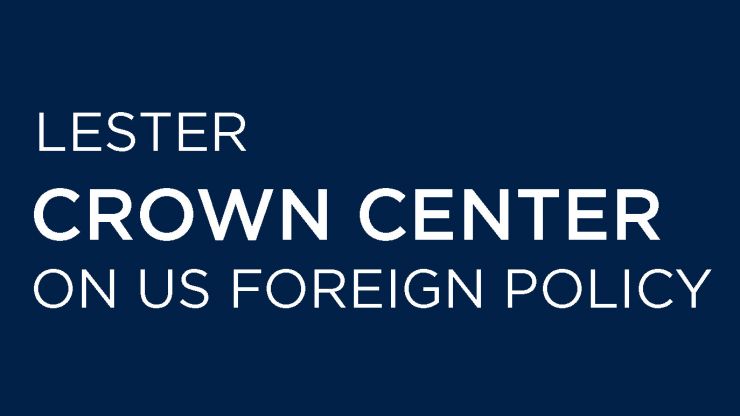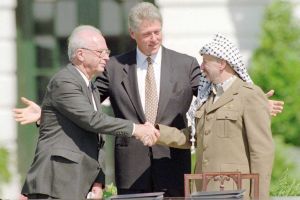The 1994 Chicago Council survey indicates that American attitudes at both public and leadership levels reflect a "pragmatic internationalism."
Introduction
This is the sixth public opinion survey and analysis sponsored by the Chicago Council on Foreign Relations. The key question in all the surveys remains the extent to which the American public and leaders support an active role for the United States overseas. The report addresses such issues as the relationship between domestic and foreign policy priorities, the response to far-reaching changes in Europe, the Middle East and Asia, and shifts in foreign policy goals and priorities.
The principal data on which the survey is based were collected just 20 years after the first survey, carried out in the autumn of 1974. The second survey was conducted in 1978, the third in 1982, the fourth in 1986andthe fifth in 1990. The results of those surveys were summarized and published in 1975, 1979, 1983, 1987 and 1991 under the title “American Public Opinion and U.S. Foreign Policy.”
The Chicago Council on Foreign Relations commissioned the Gallup Organization to collect the data for this survey, using separate but similar questionnaires for the general public and a sample of national leaders. The survey of the public involved personal interviews with a stratified, systematic, random national sample of 1,492 American men and women 18 years of age and older. The questions were weighted to eliminate sampling distortion with respect to age, sex or race.
The field work for the public survey was conducted between October 7 and October 25, 1994.
The leadership sample involved 383 individual interviews conducted by telephone between October 26 and December 7, 1994.
Summary Findings
With the Cold War over and the Soviet Union neither a perceived superpower threat nor a unified nation-state, the international political landscape has changed drastically in only a few short years. Despite these dramatic changes in the external environment, American attitudes have remained remarkably stable on a number of important questions. Neither old-fashioned isolation- ism nor activist interventionism has captured public interest. Based on this study, the attitudes of Americans at both the public and leadership levels reflect a “pragmatic internationalism.”
Pragmatic Internationalism
Americans are committed to an active role for the United States in the world, to working with other countries through the United Nations and the NATO alliance, and to freer trade. At the same time, Americans are reluctant to become entangled in the affairs of other nations and to use military force where interests are not vital. Indeed, they are selective in identifying international issues or parts of the world as vital to the country. They are aware of the impact the international system has on life at home, but their focus has shifted toward that home life and feelings of personal economic vulnerability. Crime and unemployment are considered the biggest problems facing the country by the public. Foreign policy related problems now constitute the smallest number of overall problems since 1978 for the public and the smallest ever among leaders. The preferred goals of foreign policy address matters directly related to local concerns: controlling and reducing illegal immigration and stopping the flow of illegal drugs into the country. Interest in local and state news, but not foreign news, has expanded.
The Lone Superpower
Despite their personal insecurity, Americans are confident about the capacity of the nation to influence events in the world at large. Approximately one-half the public and leaders believe the United States plays a more important and powerful role in the world today than it did 10 years ago, the highest numbers recorded in these surveys. Many people also believe the United States will be even more influential 10 years from now. These results contrast with feelings of national insecurity and weakness recorded in the late 1970s.
The public sees the United States, China and Japan playing greater roles in 10 years, while the leaders envision a future world with China, Germany and Japan increasing in relative influence. This may reflect the leaders’ greater awareness of the international economic environment, but also acknowledges the strong role the United States already plays in the world.
Regional Issues
The post-Cold-War world is one of diverse regional concerns and some threats, but none comparable to that of the former Soviet Union. There is still a perceived nuclear threat, though its source is unclear. Preventing the spread of nuclear weapons is considered one of the most important foreign policy goals by both the public and leaders.
Americans view Europe as more important to the United States than Asia, though by a narrow margin among the leaders. Economic unification of Europe is generally viewed as a good thing and concern about economic competition from the European Union has diminished. At the same time, concern about competition with Japan is still high among the public, and the concern about the power of China is growing.
The North American Free Trade Agreement (NAFTA) is also viewed as a good thing by the public and leaders. Mexico is rated highly on both the vital interest and thermometer rankings, although the recent currency crisis provoked a divided response in the U.S. Congress and among the public in early 1995.
In the Middle East, there is support for the establishment of an independent Palestinian state in the West Bank and Gaza Strip, especially among the leaders. It is unclear whether these views will hold up given the latest rash of violence between Israel and the Palestinians. Islamic fundamentalism is a matter of strong and growing concern. Middle East policy is an area where the Clinton administration receives relatively high marks on its performance.
Vital Interests
As in the past, public and leaders see vital interests in various countries of the world, though in somewhat different orders of priority. The general public rates Japan, Saudi Arabia and Russia most important, followed by Kuwait and Mexico (tied) and Canada. The top countries for the leaders are Mexico and Russia (tied for first), followed by Japan, China, Saudi Arabia, Canada and Germany. Brazil, France and Poland rank relatively low on this scale.
On a thermometer of “feelings” toward world leaders and nations, Americans show the warmest feelings for Pope John Paul II, former Secretary of State Henry Kissinger tied with former President Jimmy Carter, former President George Bush and South African President Nelson Mandela. Nations viewed most warmly are Canada, Great Britain and Italy, followed by Germany and Mexico (tied). At the bottom of the scale are Haiti, Cuba, North Korea, Iran and—last— Iraq.
Security Issues
Americans are not reacting to the end of the Cold War or the collapse of the Soviet bloc with further calls for drastic defense cuts or withdrawal from alliances. There appears to be a solidification of support for current levels of defense after previous backing of cuts. Americans favor participation in the NATO alliance and in U.N. peacekeeping operations. The public is divided on whether to insist on a U.S. commander when troops are taking part in such operations.
Germany and Japan are viewed favorably overall by the leaders. A solid majority of leaders would encourage both nations to play a more active military role in the world—though Canada receives much more encouragement for such action—and to hold seats on the U.N. Security Council.
General support remains for espionage by the CIA among the public. A plurality of the public, though only a minority of the leaders, believes the CIA should work inside other countries to weaken or overthrow governments unfriendly to the United States. There is majority support for spying on specific countries, including China, North Korea, Russia and even Japan.
Economic Issues
The public shows signs of economic concern, but no great sense of alarm. While the public is worried about Japan’s trading practices and about unemployment, it has not turned protectionist. In fact, support for tariffs has gone down among the public and leaders to its lowest levels.
Economic aid, as in the past, is not popular with the public. The public prefers to decrease or stop aid altogether to Egypt, Palestinians in the West Bank and Gaza Strip, Israel, Russia and African countries. It would keep aid the same to the newly independent countries of Eastern Europe and to Latin American countries, and increase aid to no one. Among leaders, pluralities favor increases to Eastern Europe and the Palestinians.
Concern over the federal budget deficit has declined from four years ago. While Americans are aware of the impact of U.S. foreign policy on such matters as our overall economy, the value of the dollar, the price of gasoline and unemployment, the numbers have gone down from four years ago. This may reflect a waning of concern about the state of the national economy that was evident four years ago.
Leadership
At a time when Americans perceive the greatest importance of the U.S. role as a world leader, many are disappointed in the performance of their president in foreign policy. The relative unhappiness is reflected in the list of problems facing the country. Weak leadership is cited as a major problem by notable numbers of the public and even more of the leaders. President Clinton receives some of the lowest ratings in these surveys for his handling of overall foreign policy. The leaders give the Clinton administration high marks for accomplishments in the Middle East and in international trade. The leaders give a divided response on handling of the North Korean nuclear threat.
The president is also ranked alongside nine other post-World War II presidents on his success in foreign policy. By almost every measure, he is ranked among the worst three. By one measure, George Bush, John F. Kennedy and Ronald Reagan, respectively, are at the top of the list of presidents considered either “very” or “somewhat” successful in the conduct of foreign policy, with Kennedy first when just the “very” successful category is considered.
Criticism of the administration does not translate into support for an activist Congress. There is a slight increase in the number who feel the role of Congress in foreign policy has become too strong.


